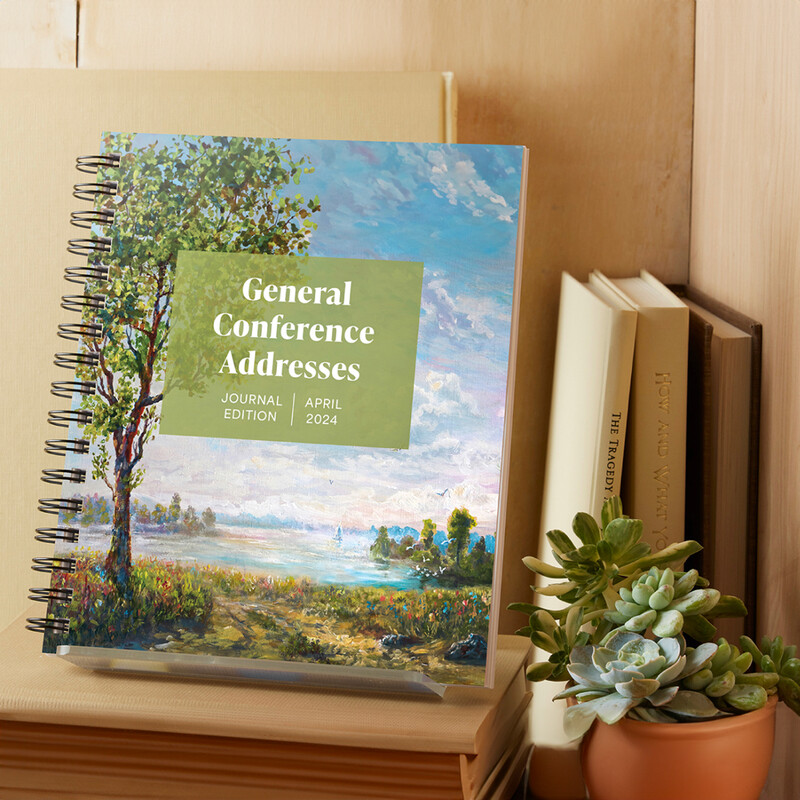For some, the biannual general conference of The Church of Jesus Christ of Latter-day Saints is a joyful time. It’s a weekend marked by yummy breakfasts, all-day pajamas, conference bingo, and other traditions. It’s also a time for spiritual renewal as millions worldwide, like the people of King Benjamin, face the prophets and other Church leaders to receive instruction.
But for others, general conference can be a time of stress and has the potential to induce guilt. It can be a stinging reminder of what they are not doing and how little spiritual progress they have made. Some Church members may even be tempted to avoid watching general conference for fear of triggering such feelings in themselves or listen to the messages with a wary attitude, expecting the worst.
But I firmly believe that the sister and brother leaders of the Church have no intention of creating such emotions in listeners. I’m confident that with some adjustments to our thinking and perceptions, we can change feelings of overwhelm to feelings of hope and encouragement. Here are three suggestions to facilitate this process:
Give Yourself Grace
I think this suggestion might be the most important because it won’t just help us through general conference weekend but will help us move forward in almost every aspect of our lives.
With very few exceptions, we are our own worst critics. I’ve known people who are very generous with the praise of others. They constantly seek to find the good in people. Every day they try to “succor the weak, lift up the hands which hang down, and strengthen the feeble knees” (Doctrine and Covenants 81:5). Yet when it comes to their own weakness and shortcomings, they are brutally critical.
If someone else makes a mistake, they say I’m sure they didn’t mean it. They were just trying their best. If they make that same mistake themselves, they say I’m so stupid! I can’t ever get things right. That’s a dramatic and unjustified difference in opinion. They are relentless in their support of others and equally relentless in self-condemnation. It’s an interesting paradox but quite common. Those afflicted by it can ultimately fall into emotional pits of anxiety and depression, further complicating their ability to think positively.
Why is it so difficult for some to give themselves grace? I don’t know for certain. Perhaps because we know ourselves so intimately and are so acutely aware of personal shortcomings, it’s easier to assign fault to ourselves than to others. Perhaps we were raised in settings where personal criticisms were commonplace, and over time we’ve come to see ourselves in primarily negative terms.
Regardless of the origins of such patterns, the solution is the same. It’s almost hidden in plain sight in the second great commandment: “Thou shalt love thy neighbor as thyself” (Matthew 22:39). Implicit in this commandment is a healthy love of self. Surely the charge does not mean that if we hate ourselves then we can justifiably hate others. It assumes that we should treat others with kindness, acceptance, love, and mercy, just like we treat ourselves.
As we become better at loving ourselves, we grow in self-compassion and self-acceptance. This can help soften times when we become aware of personal flaws.
No doubt that during general conference weekend, you might hear something that will shine a spotlight on your weakness. Instead of leading with self-condemnation, what if you said, “I know I’m flawed, but I’m trying to be better. Just as I would accept others who were sincerely striving for improvement, I can accept myself now for who I am and try each day for positive change.”
You can also strive to recognize those things in life that you can change, and those you can’t. Try to focus efforts on areas where you have control. I’m confident as you give yourself grace and focus your efforts appropriately, feelings of hope and confidence will result instead of depression and anxiety.
Align Thoughts with Truth
I have personally and professionally witnessed many, many relationship problems that stem not from what was said but from what wasn’t said but was presumed instead.
Here’s an example. You show up late for a friend’s birthday party. Your friend comes over and says, “Thanks for coming” and then resumes mingling with guests. This seems innocent enough. Your friend simply thanked you for your attendance and went back to doing what normal people do at parties. But in your mind, you start to add meaning and intent to your friend’s statement.
You think She’s probably mad that I’m late. That’s why she didn’t talk to me longer. As a result, you keep your distance from your friend. She notices your behavior, and thinks, She’s avoiding me. Why would she do that? I didn’t do anything wrong. How rude. She responds by giving you the cold shoulder. You notice her behavior, and think, That’s rude! I made all this effort to come to her party and now she’s giving me the cold shoulder. You leave early, so your friend makes assumptions about your premature departure, and before long, the two of you are embroiled in a spat that weakens your friendship.
What’s the problem? Every single assumption made in that silent exchange was incorrect. Your friend wasn’t mad at you. You weren’t avoiding her. Yet based on your collective but inaccurate perceptions of reality, a needless conflict grew.
How does this relate to general conference guilt? I recommend not making unfounded assumptions about what you think the speakers might be saying “between the lines.” Remember, they are speaking to a worldwide audience. Their remarks must be carefully crafted to apply to millions of listeners in as many different circumstances. If a general conference speaker says something and I think, “That’s a personal and targeted criticism of me,” I’m simply wrong. The Holy Ghost will sometimes prick our hearts and give us suggestions for improvement, but this is always done with love and compassion. Paul taught the Galatians “the fruit of the Spirit is love, joy, peace, longsuffering, gentleness, goodness, faith” (Galatians 5:22).
As we increase the presence of the Holy Ghost in our minds and hearts, we can create a “thought filter” that helps us see and perceive accurately. In one of his first general conference addresses as President of the Church, President Russell M. Nelson taught, “You don’t have to wonder about what is true. … If we are to have any hope of sifting through the myriad of voices and the philosophies of men that attack truth, we must learn to receive revelation. … I plead with you to increase your spiritual capacity to receive revelation. … Choose to do the spiritual work required to enjoy the gift of the Holy Ghost and hear the voice of the Spirit more frequently and more clearly.” Strive to have the presence of the Holy Spirit in your life so that your thoughts and perceptions are aligned with truth.
Pace Personal Change
When I was an adolescent, I had a summer job working in a carrot processing plant. Harvested carrots were brought to the facility where we sorted, cleaned, and boxed them for sale. Misshapen or otherwise unsuitable carrots were put on a separate conveyor belt, where they traveled along the warehouse ceiling to a giant receptacle. That is, they usually ended up in that giant receptacle—except for that morning when I arrived and saw that the conveyor belt had malfunctioned, sending thousands and thousands of carrots onto the warehouse floor.
The pile was huge; probably thirty feet tall and one hundred feet in diameter. Several younger workers stood beside me, admiring the massive orange mountain. A foreman came up to us, pointed to a rack of shovels and some bins, and said, “Clean up the carrots.” I was certain I had misheard him. This was a job for a front-end loading tractor, not six teenagers with puny shovels. But I hadn’t misheard him. We grabbed the shovels and went to work.
For the first hour, it seemed like no progress was made. The pile seemed as big as ever. By lunch, we could see the fruit of our labors, but the pile was still formidable. But by the end of the day, we tossed the last few shovelfuls of carrots into the bins. The pile was gone.
I have since reflected on this experience and what it teaches regarding change. Initially, the “carrot problem” seemed overwhelming. I was convinced that our collective efforts would not prevail. But all it took were small, consistent efforts. One shovelful at a time, over and over, eventually erased the problem.
General conference weekend always brings with it many invitations for personal change and improvement. This is a very important part of conference. We’ve come to earth to change and become more holy. Remaining stagnant is contrary to our divine purpose. As such, invitations to change can help us move forward. Still, sometimes we feel overwhelmed by these invitations, like there is an impassable chasm between our current status and what we’ve been invited to become.
Can I suggest that such chasms are crossed the same way that carrot mountains are removed? Consistent, small efforts, multiplied over days and weeks and years, yields success. This recipe is universally effective in making progress. The key is to be content with incremental gains. If we want everything changed tomorrow, we will be perpetually frustrated. Most significant adjustments to our character take considerable time and effort.
Bad habits are removed as good habits grow in their place (see Jacob 5:65–66). Give yourself time to make changes. Try not to get overwhelmed at the size of your problems, but see them as eventually surmountable as you apply consistent, diligent effort. And try to be content with your efforts. It doesn’t matter how fast the person next to you is shoveling or how many carrots they get with each scoop. Shovel at your own pace. Take breaks when needed and then get back to work. Pace your progress with wisdom and self-compassion.
I hope your experience with general conference is wonderful. I hope you will be able to love yourself enough to avoid inappropriate self-condemnation. I hope you’ll have the Spirit with you to hear and understand the messages as the Lord intends. And I hope you’ll be content with your efforts to change, making small gains every day while God happily cheers you on.
Get the April 2024 General Conference Addresses, Journal Edition
Journals will begin shipping in May.


